
Making our voices heard – advocacy and learning disability
Wednesday 11th July 2018
In July 2018 SCLD launched a scoping report: A stronger Voice? A scoping study of independent advocacy for people with learning disabilities . The Report explored advocacy provision and experiences of advocacy support for people with learning disabilities in Scotland.
People with learning disabilities often find it difficult to make their voice heard. They can experience barriers to accessing their human rights in areas such as health and wellbeing, housing, personal assistance, employment, finance and decision-making.
Independent advocacy can promote choice, access, justice, and empowerment, by helping people to have a stronger voice and address power imbalances.
However, while people with learning disabilities have a legal right to access independent advocacy, they can struggle to access this right and may not always be aware of it. SCLD’s scoping report draws on the experiences and perspectives of people with learning disabilities as well as commissioners of independent advocacy, managers and frontline workers within advocacy organisations.
SCLD went to meet with Samantha* who has been accessing advocacy with Equal Say to find out how it has been helping her to live a more empowered life.
When did you first hear about advocacy?
Samantha: “I never knew about advocacy, but then I went to church – to a group – where my son used to go and I just went there and said to the group leader that I needed help – I need to go and see people, a group or something… so I can talk to people and build up confidence.
The group leader said ‘have you ever heard of Equal Say?’ I said no, I’ve never heard about that and he said well you should contact them – people should have told you about this… He said there are people there who can talk to you, [help you to speak] for yourself and build up your confidence. He then referred me to Equal Say.”
What was it like before you had access to advocacy?
S: “I wasn’t really sure how to speak to people… some people would say ‘I don’t know what you’re saying’ or ‘have you got an advocacy worker?’ I would say ‘no – what’s that?’
Every day lots of different people would come to my house, home help, the Parent and Child Together Team (PACTT) social workers, health visitors – it was kind of like being at sea – where you’re alone and you’ve got no help, there’s no boat, no one to rescue you – you’re stuck there and you don’t know what to do. It felt like that. Nobody was listening to me. Amanda (from Equal Say) explained [everything] to me when I came here.
I had a good social worker, but then she [moved on] and I got another one – different people were coming and going [from social work] and with some people you don’t feel like you can speak to them or trust them. You are scared to speak to them. I was looking for a person to help me when I came here [to Equal Say].”
“…it was kind of like being at sea – where you’re alone and you’ve got no help, there’s no boat, no one to rescue you – you’re stuck there and you don’t know what to do.”
How did you feel once you accessed advocacy?
“I thought now I can feel a bit brave and powerful – whenever I needed to go somewhere Amanda helped or the [self-advocacy] group helped me.”
What has advocacy helped you with?
“[Amanda has helped me] with loss of work and when applying for benefits… the worker at the Job Centre confused me [about which benefits I was eligible for]… So Amanda helped me to speak to the Welfare Rights Officer” [so that Samantha could apply to and access the correct benefits].
Amanda explains to me in a nice way, so I understand.
I [also] had a problem with my son at his primary school – but the teacher said – you need to get an advocacy worker before I can talk to you. Then I told Amanda and she sorted it out really quickly – she wrote a letter – a ‘Placing Request Appeal’, even though she was going on holiday the next day.
I had to attend a Placing Request Panel – they said I won my case because I had an advocacy worker – they wouldn’t have heard me if it wasn’t for Amanda helping me to speak up. Then my son got a place in his chosen school [which was full, but was nearer to Samantha’s house and where one of her other children goes to school]. They gave me space… they listened to me. Life was much easier with an advocacy worker.
Now I’m learning lessons [in the self-advocacy group] – we’ve gotten really close and every week we’re [learning] how to build up confidence. The self-advocacy group has really helped my confidence.”
“…they said I won my case because I had an advocacy worker – they wouldn’t have heard me if it wasn’t for Amanda helping me to speak up.”
Would you recommend advocacy to other people with learning disabilities?
“Yes – people with learning disabilities should get taught about advocacy at school… people with learning disabilities need to know their rights [especially] around topics like sex, relationships and parenting.
Social workers don’t always understand how to work with people with learning disabilities… and it can be difficult to get a specialist social worker when you need one.
I speak to people and find that [many] people with learning disabilities don’t know about advocacy – but they say it’s helpful when they [access] it.
I feel good and I feel safe [now]. I’ve had a lot of struggles in the past. I wish I’d seen Amanda before, because then I wouldn’t have had [many of] the struggles in my life. I wish I’d known about the [advocacy] sooner. Amanda has been great – she has really changed my life.”
“I wish I’d known about the [advocacy] sooner. Amanda has been great – she has really changed my life.”
You can read a summary of SCLD’s advocacy report key findings here.
You can also download an easy read summary of the key findings here.
*Samantha’s name has been changed to protect her identity.


